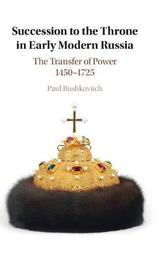
|
Succession to the Throne in Early Modern Russia: The Transfer of Power 1450-1725
Hardback
Main Details
| Title |
Succession to the Throne in Early Modern Russia: The Transfer of Power 1450-1725
|
| Authors and Contributors |
By (author) Paul Bushkovitch
|
| Physical Properties |
| Format:Hardback | | Pages:400 | | Dimensions(mm): Height 230,Width 150 |
|
| ISBN/Barcode |
9781108479349
|
| Classifications | Dewey:947.04 |
|---|
| Audience | | Professional & Vocational | |
|---|
| Illustrations |
Worked examples or Exercises; Worked examples or Exercises
|
|
Publishing Details |
| Publisher |
Cambridge University Press
|
| Imprint |
Cambridge University Press
|
| Publication Date |
18 March 2021 |
| Publication Country |
United Kingdom
|
Description
This revisionist history of succession to the throne in early modern Russia, from the Moscow princes of the fifteenth century to Peter the Great, argues that legal primogeniture never existed: the monarch designated an heir that was usually the eldest son only by custom, not by law. Overturning generations of scholarship, Paul Bushkovitch persuasively demonstrates the many paths to succession to the throne, where designation of the heir and occasional elections were part of the relations of the monarch with the ruling elite, and to some extent the larger population. Exploring how the forms of designation evolved over the centuries as Russian culture changed, and in the later seventeenth century made use of Western practices, this study shows how, when Peter the Great finally formalized the custom in 1722 by enshrining the power of the tsar to designate in law, this was not a radical innovation but was in fact consistent with the experience of the previous centuries.
Author Biography
Paul Bushkovitch is Reuben Post Halleck Professor of History at Yale University where he has taught since 1975. He is the author of Religion and Society in Russia: the Sixteenth and Seventeenth Centuries (1992), Peter the Great: The Struggle for Power (2001) and A Concise History of Russia (2011). He is a Member of the American Association for Slavic, East European and Eurasian Studies, and a member of the editorial boards of Cahiers du monde russe and Quaestio Rossica.
Reviews'In this comprehensive study of succession in early modern Russia, Bushkovitch challenges the traditional theory that the Russian monarchy operated on the principle of hereditary primogeniture. Rather, Bushkovitch offers an insightful view of succession as an evolving practice that contributed to the stability of the Russian state.' Sergei Bogatyrev, University College London 'Bushkovitch topples unexamined assumptions about normal patterns of succession in Russia from the fifteenth century through the eighteenth century. Bushkovitch's linguistic range and expansive source base open surprising and altogether new perspectives. He contributes to the recent rediscovery of diplomatic sources and uses them to build a new picture of early modern Russia.' Valerie Kivelson, University of Michigan 'Meticulously researched and wonderfully written, this book shines the spotlight on succession to the Russian throne, a vitally important theme in the early modern period. Bushkovitch goes beyond surveying the transfer of power to penetrate the very nature of monarchy in Russia, from its Muscovite roots to the death of Peter the Great, challenging us to reconsider long-held notions about custom, law, ritual, and dynasty.' Russell E. Martin, Westminster College (New Wilmington, Penna) 'A work of substantial scholarship. Bushkovitch explores and refines previous historians' assumptions about succession to the throne in early modern Russia, expertly setting the practices and concepts of the system in the context of court politics and court culture, and drawing instructive comparisons with other European monarchies.' Maureen Perrie, University of Birmingham 'The book is essential reading for both scholars of the early modern Russian state and general readers interested in learning more about the lives, families, and reigns of Russia's rulers from the Grand Princes of Moscow to Emperor Peter the Great.' Carolyn Harris, H-Net Reviews 'Historians of the Russian Empire will appreciate this work's archival dedication, which will last as a model for studying the Russian state for decades to come. Highly recommended.' A. M. Mayer, Choice '... this work is a worthwhile contribution to the debates about the nature of absolutism and succession in Russia. The research is based on a very solid base of primary sources and secondary literature. The book is highly recommended for professional historians and graduate students.' Anastasiia S. Lystsova, European History Quarterly
|